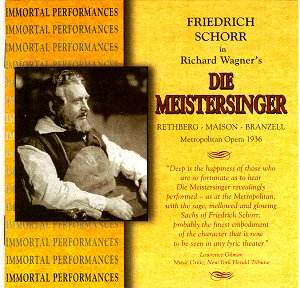No doubting whom the star is here. The booklet
cover declares this is ‘FRIEDRICH SCHORR in Richard Wagner’s …’.
Note the capitals, here faithfully reproduced. Although Bodanzky’s
name is there on the box cover, it is completely absent from the
booklet cover. All of this is indicative of ‘Meistersinger
as the Friedrich Schorr Show’; 36 minutes of tacked-on excerpts
with other conductors under the umbrella heading of ‘Schorr as
Hans Sachs’ kind of confirm impressions. Sure, there is no doubting
Schorr’s stature, but let us not forget that the great Elisabeth
Rethberg is there as Eva, not to mention Emanuel List (Pogner)
…
Whilst Schorr’s Sachs was preserved in recorded
excerpts, no complete opera was recorded in the studios, so it
is to the broadcast archives we must go. Schorr sang at the Met
for a full twenty seasons (taking 19 different roles). This Meistersinger
was recorded with a single mike pick-up so perspectives can be
mobile as characters move around the stage. There are also some
cuts to the score, including the second verse of Sachs’ ‘Jerum’.
Guild have ‘slid in’ much of Sachs’ response to the crowds’ acclaim
(‘Euch macht ihr’s leicht’) from Schorr’s 1931 commercially-available
Victor 7682, altering the acoustic space to fit the present performance.
All this shows remarkable care on the side of Guild, and the result
is a glowing Meistersinger, not least because of Herr Schorr
himself.
It does take the ear a while to adjust, though.
The overture is shrouded in the mists of time, but it becomes
clear there is much dedication at work here. The woodwind peck
away nicely and in the main there is a serene lyricism. A pity
Bodanzky spoils the close of the overture, rushing in the final
pages and in the process spoiling the ‘surprise’ choral entry.
Perhaps this was in an attempt to foreground the lighter side
of Wagner, but it takes away the triumphant feel of the climactic
fanfares, and their pre-echoes of the close of the opera.
Schorr is magnificent, especially in the second
act. He is gripping right from the outset; the ‘Flieder monologue’
is exquisitely fragranced; and he is nice and lusty at ‘Jerum!
Jerum!’. The Eva, Elisabeth Rethberg, sounds tremulous at this
point (‘Guten Abend, Meister!’), but nevertheless remains touching
and delicate. If there remain finer documents of Rethberg’s art,
she nevertheless remains the epitome of youthful freshness.
But whatever Schorr’s strengths in the first
two acts, his art reaches its zenith in Act 3. The warm, dark
tone speaks of an all-knowing compassion in the ‘Wahn monologue’;
he remains the mainstay of this performance. Perhaps that design
was right after all …
Rene Maison takes the part of Walther. In Act
2 he sounds rather unfortunately like Mime, throwing Rethberg’s
lyricism into high relief, but the advantage is that both of them
sound youthful, as is entirely appropriate. The Act 3 ‘Morgenlied’
is confident and inspiring, as of course it should be. Eduard
Habich is Beckmesser, and very funny he can be, too. Emanuel List
is another famous name, here taking Pogner. Impressive as he is,
he can ‘crack’ at critical moments.
Julius Huehn is a powerful Kothner, if sometimes
a little approximate. Hans Clemens takes the part of David, a
role he was particularly associated with at the Met, and it shows.
This performance is six years into his Met career, and his confidence
is most impressive. Magdalene (contralto Karin Branzell, who also
sang Fricka and Waltraute at Bayreuth) is rich of tone and clear.
Bodanzky provides a reading which is always fluent
if not of entirely exalted nature. Not for him the heights of
a Karajan or a Jochum. There are memorable passages, however.
The Prelude to Act 3 is rapt and sonorous of utterance, attaining
a dignity and breadth that makes one wish the entire performance
were like this. The greatest shame is that the finale is not as
apocalyptic as it could be, a direct result of Bodanzky’s somewhat
limited vision. Despite many insights along the way, and many
pleasures (chiefly from Schorr), one does not emerge uplifted
at the end, and this is surely an acid test of a performance’s
effectiveness.
The Schorresque appendix is fascinating, even
if only approximate dates and only one source number is the sum
total of discographical information (is the Malchior/Heger excerpt
DA1227, for example?).
It is always good to be reminded of conductor
Albert Coates’ prowess as a Wagnerian, and his strong conducting
of another ‘Flieder monologue’ is welcome. Rethberg is on excellent
form in ‘Sieh’ Evchen!’ (VIC8195, December 1925). Coates’ direction
again triumphs in ‘Aha! Streicht die lene’ (May 1930), which is
lovely, and expansive in conception (if not necessarily in tempo).
How better to finish this ‘Meistersinger experience’ off,
but with the quintet , ‘Selig, wie die Sonne meines Glückes
lacht’, conducted by the miraculous John Barbirolli with a line
up that includes Elisabeth Schumann and Melchior. Here is miraculous
music-making, hushed and guaranteed to transfix.
Colin Clarke
